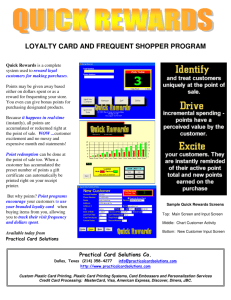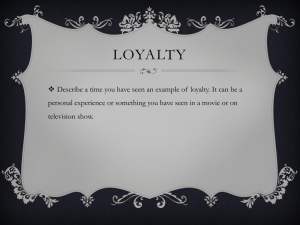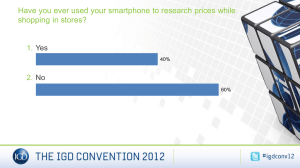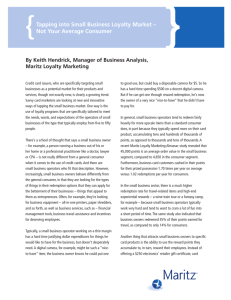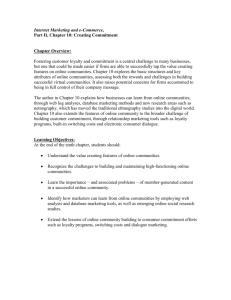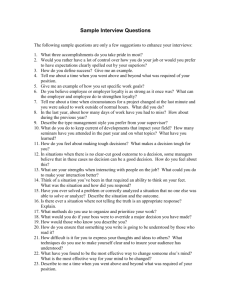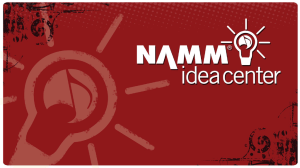Consumer Loyalty Programs
advertisement
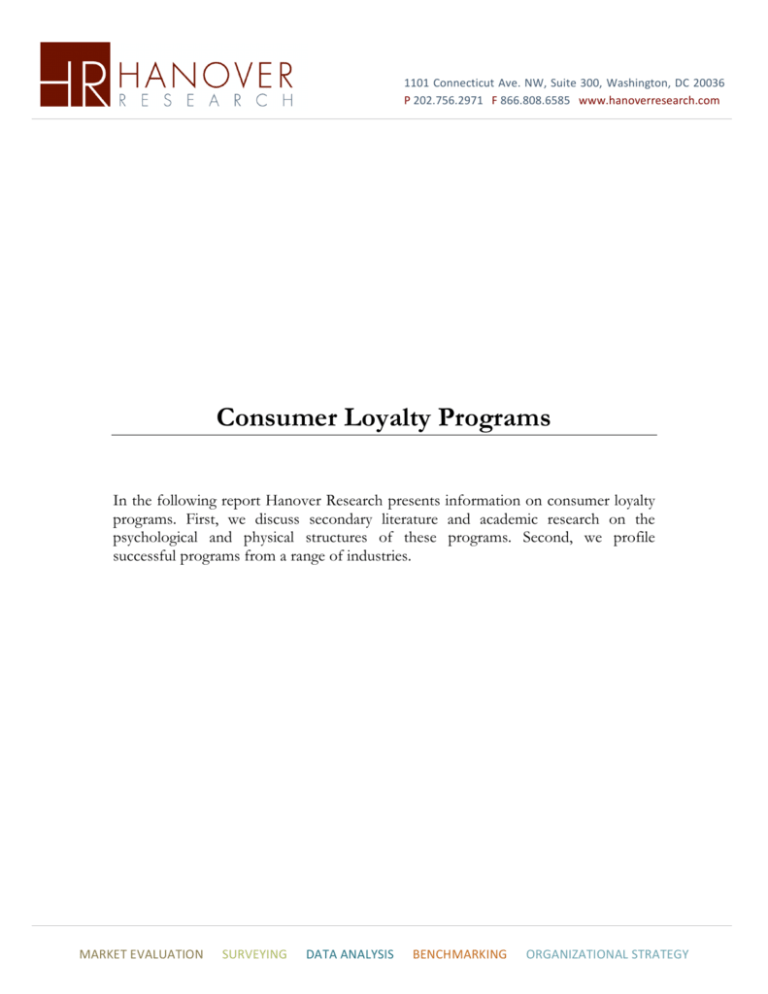
1101 Connecticut Ave. NW, Suite 300, Washington, DC 20036 P 202.756.2971 F 866.808.6585 www.hanoverresearch.com Consumer Loyalty Programs In the following report Hanover Research presents information on consumer loyalty programs. First, we discuss secondary literature and academic research on the psychological and physical structures of these programs. Second, we profile successful programs from a range of industries. MARKET EVALUATION SURVEYING DATA ANALYSIS BENCHMARKING ORGANIZATIONAL STRATEGY HANOVER RESEARCH DISTRICT ADMINISTRATION PRACTICE JUNE 2011 Introduction Customers can be fickle with their loyalty, and long with their memory. As will be demonstrated in later examples, a single negative incident can ruin a long-standing relationship because there are viable alternatives in today’s competitive market. Yet there is also an acceptance of such situations by consumers that implies that, in spite of past disappointments, consumers are willing to keep building relationships. Indeed, the successful Discover Card “Peggy” commercial series appeals to this very sentiment: the commercials parody negative experiences while simultaneously offering a better option.1 As time passed, the commercials in this series transitioned from harsh commentary on rewards program redemption hassles to the discovery of better options (with Discover). So, while every business must risk offending customers with imperfect transactions, they can still build meaningful relationships. Loyalty programs attempt to reward customers (and businesses) for sustaining such a relationship by providing clear incentives for patronage. In fact, successful loyalty programs can even accelerate the frequency of customer visits and volume of purchases, strengthening the connection.2 In this report, we identify successful loyalty program models and address the consumer’s perspective on such systems. Overview of the Report The report is structured as follows: v Section One: Literature Review The first section reviews academic and expert research on customer loyalty programs, focusing on strategies for successful implementation and considerations for not starting such a program. v Section Two: Profiles of Customer Loyalty Programs The second section profiles successful customer loyalty programs and describes consumer opinions on each program. Primary research from company websites and consumer reviews of the programs form the basis for these profiles. See, for example, see “Peggy – Rewards program – Discover Card Commercial.” November 15, 2010. Discover on YouTube.com. http://youtu.be/Md43_fjlY-M ; and “Peggy – Reward Options – Discover Card Commercial.” December 28, 2010. Discover on YouTube.com. http://youtu.be/aG3aAvQXNJk 2 “Customer Loyalty Programs.” October 15, 2008. Noel Capon with Ryan Kivetz. noelcapon on YouTube.com. http://youtu.be/HK-dDtRcO4M 1 © 2011 Hanover Research – Sales and Marketing Practice 2 HANOVER RESEARCH DISTRICT ADMINISTRATION PRACTICE JUNE 2011 Summary of Key Findings Our review of consumer loyalty programs from secondary literature and primary consumer perspectives revealed the following trends: v Consumers are very influenced by terminology and perceptions of their importance relative to others in a loyalty program. Status-laden levels of membership (e.g., “Gold”) carry significant weight and importance. v Research suggests the optimal program structure has three tiers (top elite, bottom elite, and no status) with a controlled proportion of consumer population in high tier. This structure is said to maximize feelings of superiority among all consumers while also providing another level toward which lower-tier consumers can strive. v Rewards should provide a personalized incentive, i.e., something that the specific customer will want. Strategies to achieve this include providing rewards that are not company products or services, providing options from which individual customers can choose, or using tracked purchasing habits to provide customized rewards. v Most rewards programs provide an online platform allowing customers to track their individual progress toward goals; information is typically tracked through the customer’s card when scanned at the point-of-sale (either the rewards card or a credit card). v Programs should provide targeted long-term goals and awards, rather than just immediate gratification. However, instant prizes can be an incentive to join. v Partnerships with other businesses or organizations can increase point collection opportunities for customers and improve their loyalty to the program. v Some program models create two distinct “insider” groups, pitting one against the other in a battle to find the best deals, and thus the greatest value out of their arrangement. v Successful rewards connect with the lifestyle of the typical consumer – e.g., free shipping for Amazon customers, or discounts on technology purchases for Best Buy customers. v Most of the time fees are a turnoff. However, in some cases fee-based programs are quite successful and do not generate negative attention. v Fashion retailers increasingly see experiential benefits – rather than cash or product prizes – as a means to earn the sustained attention (and loyalty) of shoppers. v Fashion retailers tend to operate loyalty programs through a store credit card. © 2011 Hanover Research – Sales and Marketing Practice 3 HANOVER RESEARCH DISTRICT ADMINISTRATION PRACTICE JUNE 2011 Section One: Literature Review Customer loyalty programs are common, but not new. The most commonly-cited “first” loyalty programs are attributed to 1930s grocery stores, which provided stamps to customers based on the sale. Stamps could later be redeemed for housewares and other goods. The escalation of these stamps programs – basically, a game of oneupmanship among competing stores – led to their demise in the 1960s, and a reinvention of loyalty programs.3 This section examines modern loyalty programs and addresses theoretical foundations for constructing such a program, including information on consumer psychology and optimal program hierarchies. It provides a top-down understanding of the interactions between consumers and the programs. Prevalence of Customer Loyalty Programs Though stamps programs waned, loyalty programs have seen a modern resurgence. Most programs are centered around a card the customer is given when signing up that, when scanned at the point of sale, contributes information to their account in a company database tracking their progress toward the program’s goals and providing the company specific information about their purchase preferences. In 2006, studies revealed that “more than 75 percent of consumers [had] at least one loyalty card, and the number of people with two or more was estimated to be one-third of the shopping population.” Both participation among consumers and competition among stores have risen dramatically since the early 2000s: “According to marketing firm Colloquy’s Loyalty Census released last year [2009], membership in U.S. customer-loyalty programs has reached 1.8 billion, up from 1.3 billion in 2007. The census showed that the average U.S. household has signed up for 14.1 loyalty programs, but only participates in 6.2 of them.”4 Companies choose to implement these loyalty programs because they perceive in them a “win-win situation” and also a “source of sustainable competitive advantage.”5 While consumers often participate in competitors’ loyalty programs, termed “polygamous loyalty,” studies have suggested that “100 percent loyal buyers tend to be light buyers of the product or service.”6 Thus, incomplete loyalty is not necessarily a disadvantage or an indication that the program has failed, as most consumers within one company’s loyalty program will at least buy some of that company’s product or service, even if they occasionally purchase a similar product or service from a competitor. “The Lowdown on Customer Loyalty Programs: Which Are the Most Effective and Why.” September 6, 2006. Knowledge@Wharton. http://knowledge.wharton.upenn.edu/article.cfm?articleid=1545 4 Notte, J. “5 Best, 5 Worst Customer-Loyalty Programs.” June 25, 2010. The Street. p. 1. http://www.thestreet.com/story/10788796/5-best-5-worst-customer-loyalty-programs.html 5 Dowling, GR, and Uncles, M. “Do Customer Loyalty Programs Really Work?” Sloan Management Review 38, no. 4 (1997): pp. 71-82. PDF p. 7. Available online at royalloyalties.com/Case_Study.pdf 6 Ibid., PDF p. 10. 3 © 2011 Hanover Research – Sales and Marketing Practice 4 HANOVER RESEARCH DISTRICT ADMINISTRATION PRACTICE JUNE 2011 However, the resurgence of loyalty programs also brings increased expectations and use among consumers, who may use multiple loyalty programs such that any one loyalty program may provide more benefit to the consumer than to the business behind the program. Kelli Grant wrote for Smart Money that7 The loyalty push is great news for consumers, too. “When every store has a loyalty program, it’s as if nobody has one,” says Edgar Dworsky, founder of consumer advocate site ConsumerWorld.com. “There’s no motivation to shop at one place as opposed to another.” Such competition has forced retailers to offer even more attractive incentives than they normally would to stand out. As with early stamps programs, the prevalence of loyalty programs has induced a one-upmanship competition among businesses. This positive feedback loop can “teach your customers that your product is not worth full price.”8 Furthermore, Dowling and Uncles (1997) argued that the “empirical regularities” characterizing most “established and competitive markets” mean that “anything as easy to replicate as an ‘add-on’ customer loyalty program” cannot bring significant change to the average business.9 These misfortunes can be particularly true for major fashion retailers. When Nordstrom launched a new program in April 2007, it found that “offering cash back on purchases to frequent customers isn’t enough to build the elusive quality of ‘loyalty.’” Instead, the program offered luxury travel and shopping Competition among experiences. Experts observed that “basic companies offering loyalty rewards programs” are no longer enough incentives reduces the in retail – “they have to add experiential potential profits for benefits to stay ahead of all the other companies, but consumers options that are in the marketplace.”10 have come to expect the personal connection they These data suggest two contrasting get through these programs. conclusions. First, while loyalty programs are increasingly prevalent, the connection between participation and enduring loyalty is unclear. The data do not indicate that all companies benefit from having a consumer loyalty program. Yet, second, to not have a consumer loyalty program today can negatively affect a company’s business. As Teri Gault, the consumer, founder and CEO behind savings website The Grocery Game, noted in a segment for CBS News, “Everybody’s doing it, and if Grant, K.B. “Retailers Expand Customer-Loyalty Programs.” March 31, 2008. SmartMoney.com. http://www.smartmoney.com/spend/family-money/retailers-expand-customer-loyalty-programs-22801/ 8 “Why most loyalty programs don’t work.” October 27, 2009. imagineeringnow on YouTube.com. http://youtu.be/mHzkOErrCT0 9 Dowling and Uncles, 1997, Op. cit.: PDF p. 13. 10 Todé, C. “Nordstrom upgrades loyalty program experience.” May 4, 2007. Direct Marketing News. http://www.dmnews.com/nordstrom-upgrades-loyalty-program-experience/article/95464/ 7 © 2011 Hanover Research – Sales and Marketing Practice 5 HANOVER RESEARCH DISTRICT ADMINISTRATION PRACTICE JUNE 2011 you’re not doing it you’re probably not up to speed.”11 The following section addresses strategies for businesses to maximize their gains from these seeminglymandatory consumer loyalty programs. Assumptions about Customers in Loyalty Programs Customer loyalty programs seek three outcomes: “to enhance the overall valueproposition of the product or service;” “to motivate buyers to make the next purchase of a product;” and to “support other aspects of the firm’s offensive and defensive marketing strategies.”12 To maximize the gains in these areas requires a deep understanding of how consumers view and use customer loyalty programs. There are five underlying assumptions about how customers interact with these incentives:13 v a significant number of customers want an involving relationship with the brands they buy, v a proportion of these buyers are hard-core loyal and only buy the one brand, v these hard-core loyal buyers are a profitable group because they are numerically large and are heavy or frequent buyers, v it should be possible to reinforce the loyalty of these buyers and encourage them up a ‘loyalty ladder,’ and v database technology can be used to establish a personalized dialogue with customers which will bring about moves up the loyalty ladder.” That is, marketers assume that customers want to play the game and can be encouraged to participate with increasing devotion to a particular brand. However, the actual tested experiences of consumers involved in loyalty programs challenge such an easy understanding of this progression from interest to loyalty. For example, what customers want from these programs can be difficult to identify. Noted loyalty-program researcher Xavier Drèze examines the paradox of consumer “wants” below, in the context of airline miles programs: “You would think that if people were offered money and miles, they would always take the money, but a lot of people want the miles instead,” Dreze says. “Their feeling is, ‘Money is only money and if I take money instead of miles, I’ll just use the money to pay a bill.’ There’s nothing special about paying a bill. But when they take frequent-flier miles as a reward instead of cash, they will use them to take trips and that gives them memories. That makes the miles special. The airlines consider their programs “CBS News: The Price of Loyalty.” October 12, 2007. jraaronson on YouTube. http://youtu.be/CZKOOLe5FdQ Dowling and Uncles, 1997, Op. cit.: PDF p. 5. 13 Ibid., PDF p. 6. 11 12 © 2011 Hanover Research – Sales and Marketing Practice 6 HANOVER RESEARCH DISTRICT ADMINISTRATION PRACTICE JUNE 2011 ‘aspirational’ as fliers earmark their miles for special trips. There’s a lot going on psychologically when it comes to taking miles or some other kind of rewards points. People don’t consider miles or points to be the same thing as money.”14 Drèze found that consumers worked toward rewards goals in the same way that they might work toward a savings goal. However, these consumers did not want their hard-earned prize “currency” to become associated with banal transactions like billpaying. Rather, they saved their points to get larger, more personal rewards like vacations. The reward that might be intuited as most appealing (money) was complicated by a larger psychological context. Loyalty Program Characteristics The reward psychology described above points to a deep desire among consumers for a loyalty program that offers them a personal connection to the lifestyle associated with their purchases. Kim Gordon, writing for Entrepreneur.com (2010), suggested that effective loyalty programs:15 v Do not abandon service: “Your best customers want personalized service and support that’s accessible instantly – often by phone.” v “Make communication a two-way street:” Use a variety of media to engage consumers in dialogue about the program, the brand, and their experiences. v “Avoid loyalty turnoffs:” Ensure an appropriate tone and frequency of communications, and maintain an open and welcoming program that enables all participants to achieve and redeem rewards. v Treat customers as individuals: “They want you to learn their buying preferences and offer rewards they truly value… [for] deeper engagement.” Each of these characteristics focuses on a one-to-one relationship between the business and the consumer. This suggests that successful programs are flexible enough to accommodate the variety of needs among participants or target specific lifestyles associated with the products or services at the center of transactions. Don Peppers (2009) offered similar propositions in a five-minute video identifying the “five loyalty best practices” based on his years of consulting experience:16 “The Lowdown…Why,” 2006, Op. cit. Gordon, K.T. “The newest insights into loyalty programs reveal the best ways to engage customers.” March 12, 2010. Entrepreneur.com. http://www.entrepreneur.com/marketing/marketingcolumnistkimtgordon/article205508.html 16 “Peppers Unplugged: Five Loyalty Best Practices in Five Minutes.” July 23, 2009. Don Peppers on 1to1Videos at YouTube. http://youtu.be/fgsZNa5gwvI 14 15 © 2011 Hanover Research – Sales and Marketing Practice 7 HANOVER RESEARCH DISTRICT ADMINISTRATION PRACTICE JUNE 2011 v Insight: Never waste an opportunity to gain additional customer insight; build information about a customer’s individual needs to serve as a platform for increasing interactions. v Modularity: Create a “plug-and-play” system that allows easy addition or subtraction of vendors, partners, and other relationships. v Openness: Consider providing prizes that do not necessarily need to be redeemed from your company – reward the customer without setting explicit limitations about prizes being confined by store products or services. v Simplicity: Avoid setting too many restrictions (such as black-out dates or specific products as rewards) to ensure that any customer who achieves the reward can actually use it. v Relationships: Do not manage the program around products, brands, and stores, but rather around individual customers. Segment the program’s participants to understand their particular motivations – this will allow for further improvements in the program and in the company’s business. Peppers stresses that the insight a company gains from consumer participation in their loyalty program is perhaps the greatest gain for the company, rather than any monetary benefits. Seth Priebtasch and Rob McFeeley echoed Gordon’s and Peppers’s suggestions in a recent Huffington Post article (2011) on “engineering successful customer loyalty programs.” Their suggestions focused on more specific business strategies:17 v Provide transactional rewards with few or no obstacles: “Whenever you ask the consumer to complete an additional action beyond the transaction in order to gain credit in a loyalty program, you’re placing distance between the positive emotion elicited by the reward and the action of purchasing an item or experience.” v Reward customers for finding new patrons: “Turn customers into advocates for business by incentivizing them to spread the word about the deal with their friends.” v Advertise the program effectively: Use social media, trained sales representatives, and traditional signage to “develop strong relationships with your customers and inform them of new offerings.” v Provide meaningful rewards options: “Make an effort to allow customers in your loyalty program to choose how to apply their rewards,” while also providing “a set of logical steps toward some clearly defined goal.” Priebtasch, S., and McFeeley, R. “Engineering Successful Customer Loyalty Programs.” May 10, 2011. The Huffington Post. http://www.huffingtonpost.com/seth-priebatsch/customer-loyalty-programs_b_859462.html 17 © 2011 Hanover Research – Sales and Marketing Practice 8 HANOVER RESEARCH DISTRICT ADMINISTRATION PRACTICE JUNE 2011 The advice of Priebtasch and McFeeley again suggests a one-to-one, personal relationship between the company and customer, with specific ideas about how to construct that relationship. Drèze (2006) tied this personalization to stronger and longer ties between the customer and the company offering the program: “Loyalty programs… need to be designed to offer differentiated products and services to customers based on their purchasing patterns and profitability. If these programs are simply based on quantity discounts or paying for patronage, they will not endure.”18 Thus the next question to address is one of structure: what does a successful program look like? Loyalty Program Structures Dowling and Uncles (1997) provided an in-depth look into customer loyalty programs, identifying transactional and structural models explaining the relationship between participants and the company. They emphasized that “exploring the potential for loyalty programs to disturb ‘normal’ patterns of behavior also involves three psychological considerations: v the extent to which loyalty is to the brand (a direct effect) or to the program (an indirect effect), v the way buyers value the rewards on offer, and v the effect of timing on these assessments.”19 Loyalty programs attempt to “change the customer’s choice process from operating in a spot market to operating in a multi-period contractual (relationship) market.”20 Specifically, loyalty programs attempt to provide a delayed reward that directly supports the product’s value proposition, or a delayed reward that provides some other indirect type of reward. Thus all loyalty programs provide delayed gratification, but the reward structure can be somewhat flexible. The illustration below identifies potential reward schemes – note that loyalty programs fall into Cells 2 and 4: “The Lowdown…Why,” 2006, Op. cit. Dowling and Uncles, 1997, Op. cit.: p. 14. 20 Ibid., p. 20. 18 19 © 2011 Hanover Research – Sales and Marketing Practice 9 HANOVER RESEARCH DISTRICT ADMINISTRATION PRACTICE JUNE 2011 Types of Reward Schemes Source: Dowling and Uncles, 1997, Op. cit.: p. 16. Within a reward program, not all customers must be treated the same. In some instances, it can be beneficial to offer increased credits toward a goal as a customer spends more money. This provides both an incentive to spend more, and provides greater gratification for those who do spend more. The following figure illustrates differences in reward schedules: Loyalty Program Reward Schedules Source: Dowling and Uncles, 1997, Op. cit.: p. 21. © 2011 Hanover Research – Sales and Marketing Practice 10 HANOVER RESEARCH DISTRICT ADMINISTRATION PRACTICE JUNE 2011 Sub-dividing the participant population as suggested by a differential reward schedule can lead to greater insight about a company’s customers, as emphasized by Peppers. However, this also establishes a hierarchy. Drèze (2009) conducted a series of studies on consumer loyalty programs and found that the structure of a loyalty program hierarchy matters. The initial pilot study testing the null hypothesis (see text box, below for details) revealed that an elite tier was most effective when it contained only a small portion of the total population – either 1 or 5 percent. At these sizes more than 80 percent of the elite group felt “special,” whereas elite groups that contained 10 percent or 25 percent of the total population were much less effective at making members feel that their elite status was special.21 Optimal loyalty program models have two elite tiers utilizing status terminology and encapsulating a small (top tier) and medium (bottom tier) proportion of the total consumer population, plus a large non-status tier. Further studies revealed that these tiers were most effective when participants had a reference to determine their relative importance, particularly the use of status-laden terminology.22 In addition, when the size of the bottom-elite tier (e.g., Silver) was increased, “perceptions of status or members’ sense of superiority decreased as the second tier grew.”23 Yet, while “Gold members are made to feel more elite when a Silver class is added, [Drèze found] no evidence that the addition of a Bronze class below Silver further heightens perceptions of status.”24 Importantly, Drèze found that most participants in the Silver and non-status tiers wanted a higher status (Gold) to work toward: “three-quarters of participants either believe those who stay [in the fictional hotel chain] more often deserve more or like the idea of something to strive for despite being advised they were unlikely to achieve status in the foreseeable future.”25 Optimal program models thus had two elite tiers utilizing status terminology and encapsulating a small (top tier) and medium (bottom tier) proportion of the total consumer population, plus a large non-status tier. The following text box summarizes Drèze’s tested (and supported) hypotheses in this project: Drèze, X. “Feeling Superior: The Impact of Loyalty Program Structure on Consumers’ Perceptions of Status.” Journal of Consumer Research 7, no. 3 (2009): pp. 890-905. PDF p. 15. Available online at: www.xdreze.org/Publications/Feeling082008.pdf 22 Ibid.: p. 23. 23 Ibid.: p. 18. 24 Ibid. 25 Ibid.: pp. 35-36. 21 © 2011 Hanover Research – Sales and Marketing Practice 11 HANOVER RESEARCH DISTRICT ADMINISTRATION PRACTICE JUNE 2011 Hypotheses About Effective Consumer Loyalty Programs v H0: The fewer people granted elite status, the more superior these people will feel. v H1a: A second elite tier will elevate perceptions of status among consumers in the top tier. v H1b: The smaller the size of the second tier, the greater the perception of status among consumers in the top tier. v I1: Firms can offset a dilution in perceptions of status accompanying a larger top tier by having a second elite tier. v I2: Having a second, subordinate tier in place can offset a dilution in perceptions of status brought about by the introduction of a new super-ordinate tier. v H2: The presence of additional tiers below a second elite tier will not impact the perception of status among those consumers in the top tier. v H3: Consumers derive information about the structure of the hierarchy from statusladen labels. v H4a: For those in the middle, the evaluation of one’s status depends primarily on the number of tiers above. v H4b: If the number of tiers above threatens one’s perceived status, the number of tiers below can offer status enhancement. v H5: When introducing a super-ordinate tier, adding or maintaining a subordinate tier will lessen the negative impact of the introduction. Source: Drèze, X. “Feeling Superior: The Impact of Loyalty Program Structure on Consumers’ Perceptions of Status.” Journal of Consumer Research 7, no. 3 (2009): pp. 890-905. PDF pp. 10-14. Available online at: www.xdreze.org/Publications/Feeling082008.pdf © 2011 Hanover Research – Sales and Marketing Practice 12 HANOVER RESEARCH DISTRICT ADMINISTRATION PRACTICE JUNE 2011 Section Two: Model Consumer Loyalty Programs Companies look for increased sales and better customer relationships from their loyalty programs. Consumers, on the other hand, are often more interested in the rewards than in the relationships: status, cash, and prizes. Kelli Grant explained the top shopper advantages of loyalty programs in an article for SmartMoney.com:26 Highly-rated loyalty programs build relationships with the consumer and offer immediate rewards, longterm savings, and have easy program requirements. v Immediate rewards: “Make sure to sign up for any free loyalty program you’re offered, even if you aren’t a frequent customer. As soon as the day you sign up, you could start reaping the rewards of your membership.” v Targeted deals (member exclusives): “Loyalty clubs often offer members access to exclusive sales and coupons such as inviting them to ‘friends and family’ sales events. Now retailers are taking it a step further by targeting their regular shoppers with customized incentives based on information like their personal shopping habits.” v Souped-up membership cards: Though consumers participate in many loyalty programs, they typically only carry one or two membership cards regularly. This requires unique approaches to ensuring customers participate: using credit cards or phone numbers as alternatives, e.g. v Manufacturer rewards: Manufacturers are offering reward points through codes printed on the packaging of their product, allowing frequent buyers to earn merchandise in exchange for their spending habits. v Point-earning partnerships: “Retailers want to be front and center with customers, even if they aren’t purchasing their products…[which] has led to a growing number of partnership programs between retailers and online shopping portals, where consumers earn points from one retailer that they then can use to shop at another.”27 Just as companies want to be “front and center” in their rewards programs, customers want to be front and center in their relationship (through the program) with the company. “Top programs” lists play up benefits to consumers like immediate rewards, long-term savings, and easy program requirements. The Street, for example, selected the “top five” programs based on their unique rewards Grant, K.B. “Retailers Expand Customer-Loyalty Programs.” March 31, 2008. SmartMoney.com. http://www.smartmoney.com/spend/family-money/retailers-expand-customer-loyalty-programs-22801/ 27 Grant, 2008, Op. cit. 26 © 2011 Hanover Research – Sales and Marketing Practice 13 HANOVER RESEARCH DISTRICT ADMINISTRATION PRACTICE JUNE 2011 structures, options, and openness; its “worst five” programs, on the other hand, were characterized by useless rewards, difficult to achieve goals, or restricted prizes.28 Below, we review effective customer loyalty programs by Best Buy, Amazon.com, Starbucks, and Barnes and Noble. These programs illustrate several different structures discussed in Section One: multi-tiers, fee-based, and a variety of reward options. Some of these programs have generated intense discussions about the program benefits and utility, while others have not been as polarizing or polemical. They represent also a range of industries, include electronics/technology, books, food/beverage, and general sales. The success of these programs suggests that customer loyalty programs can be customized to any industry and do not need to follow a specific standard model. However, we also note that many fashion retailer rewards programs differ from the profiled programs in their structure. While most programs profiled below provide a specific membership number or card, most fashion programs are operated through a store credit card program. That is, reward points are tracked through the customer’s store credit card number rather than a unique membership number. For example, Ann Taylor LOFT Credit Card holders can receive LOVE LOFT REWARDS points for in-store or online purchases with their credit card, which earn gift cards at intervals and other bonuses or prizes for being a credit card member.29 The AEREWARD$ card by American Eagle allows cardholders to earn points for purchases made at American Eagle, Aerie, or 77Kids, which earn discount certificates at regular three-month intervals and some additional bonuses or prizes for being a credit card member.30 Running a rewards program through a store credit card will likely exclude the average consumer because it requires a specific financial commitment – applying and being responsible for a credit card – that most non-loyal shoppers will be unwilling to make. However, we note that the rewards are generally consistent among fashion programs and those profiled below – discounts, special attention or prizes, and certificates toward future purchases. Best Buy Reward Zone The Best Buy Reward Zone is a three-tier loyalty program (Premier Silver, standard, and nonmember) providing customers the opportunity to earn money back and gain access to special deals, without paying a membership fee. The program is simple to understand – one point per dollar spent, with some restrictions and also some bonuses – and Notte, 2010, Op. cit. “Ann Taylor LOFT Credit Card.” Ann Taylor. Accessed June 22, 2011. https://onlineaccess.mycreditcard.cc/anntaylorloft?Action=Intro.jsp 30 “AEREWARD$.” American Eagle. Accessed June 22, 2011. http://www.ae.com/web/myaccount/aerewards.jsp 28 29 © 2011 Hanover Research – Sales and Marketing Practice 14 HANOVER RESEARCH DISTRICT ADMINISTRATION PRACTICE JUNE 2011 easy to access, with the ability to track and redeem points online. The program provides a certain feeling of status – “exclusive access to member-only offers” – with the promise of even better savings at an elite tier, the Premier Silver status. Furthermore, while most benefits are redeemable only at Best Buy or its online store, Reward Zone members also gain access to special deals with partners, including concert tickets, events, and other offers; and they are able to participate in special pre-orders for new products.31 Reward Zone benefits32 v v v v v v Enjoy the following benefits with your Reward Zone membership: No fee membership Earn 1 point for nearly every $1 you spend. Reach Premier Silver status and earn even more For every 250 points earned, receive a reward certificate for a $5 discount on future purchases at Best Buy stores and at BestBuy.com Get exclusive access to member-only offers such as product pre-order, pre-sale concert tickets, events, sweepstakes and more Take advantage of Program Partners and Online Mall special offers Track and redeem points online Standard membership is open to all U.S. residents at least 13 years of age. Premier Silver status requires standard members to spend at least $2,500 on qualifying purchases at Best Buy or its online store in a calendar year; this status can be revoked if the member does not continue to spend a minimum of $2,500 each consecutive year. In addition to the basic three-tier program, customers can choose to sign up for either a Reward Zone Credit Card or a Reward Zone MasterCard to finance their purchases. (The MasterCard can be used outside of Best Buy, as well.) Reward Zone MasterCard holders who spend at least $2,500 on qualifying purchases inside or outside of Best Buy in a single year qualify for additional benefits on top of Premier Silver status.33 The following table summarizes point earnings and basic point-related benefits for each level of membership with and without a Reward Zone MasterCard: “Learn About the Program: Reward Zone benefits.” BestBuy.com. Accessed June 17, 2011. https://myrewardzone.bestbuy.com/about/;cshid=l6JE3HuPZt9rjOlEcH6g.2306 32 “Learn About the Program,” Op. cit. 33 “Frequently Asked Questions: Membership & Benefits.” BestBuy.com. Accessed June 17, 2011. https://myrewardzone.bestbuy.com/about/faq/membershipandbenefits 31 © 2011 Hanover Research – Sales and Marketing Practice 15 HANOVER RESEARCH DISTRICT ADMINISTRATION PRACTICE JUNE 2011 Best Buy Reward Zone Point System Membership level Standard Premier Silver Using Reward Zone MasterCard? No Yes No Points earned for Best Buy purchases* 1:$1 2:$1 1.25:$1 Yes 2.5:$1 Other point-related benefits None • Point banking • Extended expiration date for reward discount Source: Adapted from BestBuy FAQ explanation of benefits *NB: Reward Zone MasterCard members can earn points outside of Best Buy Some time restrictions apply on the redemption of earned rewards. Points are posted 35 days after the date of purchase, which means customers cannot return an item before the points are applied to their account. (See below for discussion of a loophole.) In the website’s FAQ section readers learn that “Reward Certificates expire 90 days after the date issued for standard members, and 180 days after the date used for Premier Silver and Reward Zone program MasterCard members.”34 Furthermore, once a standard member earns the 250 points required to receive a certificate, s/he is automatically issued the discount certificate – Premier Silver members can “sit on” the points as long as the account does not remain inactive for 12 consecutive months.35 This means that standard members must make another purchase within three months of the last qualifying purchase to be able to redeem the $5 discount; Premier Silver members have an additional three months to act. Another perk of the Best Buy program is that it interfaces with mobile technology. Using the free Reward Zone Mobile app, members can access their Reward Zone points on their mobile devices, never needing to print out their reward discount slips before making their next purchase.36 The program actively attempts to connect their product – technology – with the lifestyle preferred by their tech-savvy consumer market. Consumer Opinion Best Buy’s Reward Zone was named one of the top five best customer loyalty programs by The Street, a digital financial media company providing news, insight, and related content on investments. Their plaudits went to an improved membership structure – no more fees! – and a relatively simple award system – 1-to-1 at standard level. In general, they saw the program as beneficial for casual Best Buy browsers and technology “junkies” alike; everyone wins. “Frequently Asked Questions: Rewards & Certificates.” BestBuy.com. Accessed June 17, 2011. https://myrewardzone.bestbuy.com/about/faq/rewardsandbenefits 35 Ibid. 36 Ibid. 34 © 2011 Hanover Research – Sales and Marketing Practice 16 HANOVER RESEARCH DISTRICT ADMINISTRATION PRACTICE JUNE 2011 Consumers have also given the Reward Zone positive attention. Frugal bloggers like Naoma Doriguzzi (www.asknaoma.com) love that the system allows them to “save up” to get free stuff. Doriguzzi was particularly happy to earn “free” points by spending time or money with Best Buy partners, such as test-driving a 2011 Ford Edge to earn 2,500 points – the equivalent of $50 in discount certificates toward Best Buy purchases.37 For Doriguzzi, spending money at Best Buy encourages her to spend even more money at Best Buy because she wants to save up these points to earn free products. (Note that Doriguzzi must be a Premier Silver member to be able to “bank” her points.) Others are similarly enthusiastic about being able to participate. Jeremy of His&Hers DIY showcased achieving the successively higher levels of membership in Reward Zone as the most effective method “to earn Best Buy Reward Zone points faster.” He is clear that all ways to increase accumulation generally “involve spending money,” but insists that this “will allow you to cash in on the savings in the end.”38 Writers for Hip2Save, a female-focused couponing and deals blog, were enthusiastic about the partner promotions available through Reward Zone. In April 2011 they highlighted the relationship between Best Buy and Shutterfly, an online photo company, which allowed Reward Zone members to “score 50 FREE points” and potentially “earn 250 Best Buy Reward Zone points” simply through participating in different aspects of Shutterfly’s operations (e.g., creating an account, creating a “Share” site).39 Several other bloggers promoted this arrangement, reflecting the high interest in the deal – connecting technology purchases to a technology lifestyle – and increasing awareness of both programs. Jennifer of Sisterly $avings similarly played up Best Buy partnerships. In May 2011, the Red Cross’ own “loyalty program,” Red Cross Racing, offered a 250-point signing bonus to new members and also allowed members to convert their Red Cross points into Best Buy points. The conversion allowed new Red Cross Racing members to receive an additional 200 free Best Buy Reward Zone points.40 Thus, blood donors can earn Best Buy Reward Zone points, which may be a more attractive reward for some than the currently-offered Nascar gear. However, not all attention is positive. Some consumers have used loopholes in the program to earn free rewards (independent of promotions), potentially undermining the program’s long-term viability. According to mjepilot on YouTube, the “How I Get FREE stuff from Best Buy using my Rewards Zone Card!!” December 20, 2010. doriguzzi on YouTube. http://youtu.be/LHdbxtWr4BM 38 Jeremy. “How to Earn Best Buy Reward Zone Points Faster.” March 1, 2010. His&Hers DIY. http://hisandhersdiy.com/how-to-earn-best-buy-reward-zone-points-faster/ 39 “Best Buy Rewards Zone: Earn $5 in Free Rewards.” April 26, 2011. Hip2Save.com. http://hip2save.com/2011/04/best-buy-rewards-zone-earn-5-in-free-rewards.html 40 Jennifer. “*HOT* Best Buy Rewards Zone: Get 200 Free Points.” May 28, 2011. Sisterly $avings. http://sisterlysavings.net/2011/05/hot-best-buy-rewards-zone-get-200-free-points/ 37 © 2011 Hanover Research – Sales and Marketing Practice 17 HANOVER RESEARCH DISTRICT ADMINISTRATION PRACTICE JUNE 2011 extended return period for Premier Silver members allows them to get reward points applied to products (35-day policy) that they can then return (45-day policy). In his example, he returned a high-cost television after 44 days while retaining the related $80-90 in reward certificates; thus, Best Buy basically gave him $80-90 without receiving any purchase money from him in return. The promoter admits this is “not the most honest thing to do,” but feels that it is nice to “stick it to the man” on occasion, with Best Buy representing “the man” in this scenario.41 Finally, even enthusiastic program participants can be turned away from the program by negative experiences. Matthew Serta’s difficult experience in purchasing a group of products during a special deal at BestBuy.com encouraged him to take his patronage elsewhere – specifically, to Walmart. Until this event, he “had no complaints” and would “spend around $2,000 a year” with the company. Serta attempted to purchase several products during a promotional. First, he was incorrectly charged for the products, but this was handled adequately by service representatives who placed a $25 credit on his credit card for an error of approximately $8. However, the resolution of a second error – receiving incorrect products – at first accounted for the shipping error resolution generosity, and then required the customer to make several frustrating calls. He is not likely to return, because he sees better competitors with fewer headaches are available.42 Amazon Prime Exposure in The New York Times, Business Week, PC Mag, Real Simple and other prominent publications testify to the ubiquity of Amazon Prime, the customer loyalty program of one of the internet’s largest retailers. This is a fee-based two-tiered program (member, non-member) offering discounts on shipping, access to Amazon Instant Video, and 1-Click shopping: Amazon Prime43 Amazon Prime is a membership program that gives you and your family unlimited fast shipping, such as FREE Two-Day shipping and One-day shipping for $3.99 per item on all eligible purchases for an annual membership fee of $79. Amazon Prime members can enjoy instant videos: unlimited, commercial-free, instant streaming of 5,000 movies and TV shows through Amazon Instant Video at no additional cost. Eligible customers can try out a membership by starting a free trial. “Best Buy Rewardzone Loophole – Free Gift Certificates.” June 29, 2010. mjepilot on YouTube.com. http://youtu.be/pQhdclx98q8 42 Serta, M. “Rant about Best Buy.” May 24, 2011. matthewserta on YouTube.com. http://youtu.be/HlCY92py3pw 43 “Amazon Prime.” Amazon.com. Accessed June 17, 2011. http://www.amazon.com/gp/help/customer/display.html?ie=UTF8&nodeId=13819211 41 © 2011 Hanover Research – Sales and Marketing Practice 18 HANOVER RESEARCH DISTRICT ADMINISTRATION PRACTICE JUNE 2011 BusinessWeek suggested that “Amazon Prime may be the most ingenious and effective customer loyalty program in all of e-commerce,” citing its ability to convert complete outsiders (“What is Amazon?”) into total enthusiasts (as quoted in the article, “Now if I see or hear about a product somewhere else, I’ll always check first to see if Amazon has it.”). It has become the model for competitor programs, including Best Buy, Target, and J.C. Penney.44 The program has received particular attention for two additional initiatives: free Amazon Prime for college students for one year (those with a current .edu email address),45 and hints of a forthcoming free Kindle promotional for Amazon Prime subscribers (well-founded theories based on dropping Kindle prices).46 Although the program has received some negative press based on the fact Prime membership is automatically renewed – and customers are automatically charged for that renewal – and has also been accused of differential pricing for different types of customer accounts, the loyalty program has been successful overall. The bottom line, as evidenced in Virginia Heffernan’s article in the Times,47 is that Amazon Prime members want to feel special – and non-Prime members want to feel like they’re superior. In other words, this program has created two “insider” groups – the believers in Prime, and the believers in not-Prime – which establishes an incentive for each group to find and share the best deals, attributing the bargains to either their membership or non-membership. This results in a bigger profit for Amazon as a whole. Consumer Opinions Enthusiasm for Amazon Prime is as evident in consumer opinions as in the major publications cited above. For example, “Mighty Bargain Hunter” (MBH) wrote in 2008 that “If you love Amazon, you’ll really love Amazon Prime.” He noted several key benefits for Prime membership:48 Stone, B. “What’s in Amazon’s Box? Instant Gratification.” November 24, 2010. Bloomberg BusinessWeek. http://www.businessweek.com/magazine/content/10_49/b4206039292096.htm 45 See, e.g., Hatchman, M. “Amazon Gives Free Amazon Prime to College Students.” July 13, 2010. PCMag.com. http://www.pcmag.com/article2/0,2817,2366420,00.asp 46 See, e.g., “Free Kindle This November.” February 25, 2011. The Technium. http://www.kk.org/thetechnium/archives/2011/02/free_kindle_thi.php 47 Heffernan, V. “Amazon’s Prime Suspect.” August 6, 2010. The New York Times. http://www.nytimes.com/2010/08/08/magazine/08FOB-medium-t.html 48 “If you love Amazon, you’ll really love Amazon Prime.” August 13, 2008. MightBargainHunter.com. http://www.mightybargainhunter.com/2008/08/13/if-you-love-amazon-youll-really-love-amazon-prime/ 44 © 2011 Hanover Research – Sales and Marketing Practice 19 HANOVER RESEARCH DISTRICT ADMINISTRATION PRACTICE JUNE 2011 v We buy specialty foods. The online prices for specialty foods are in some cases way better than what we can get in a store. Since our daughter has food allergies, there are some staple foods that we would be buying anyway, so the expenses really aren’t that discretionary. We saved enough money on one order to justify the cost of a full year of Amazon Prime. Then, most everything else we buy from Amazon.com ships for free, too, and this is gravy! v Two-day shipping means two-day shipping. This is a fast service. It’s only been once or twice that the order hasn’t come within two business days, and they were weather-related. Getting orders that fast sure spoiled us in a hurry. v Because this is such a fast service, we’ve never had the need to upgrade to overnight shipping! v It’s no extra work to use it. We just log into our Amazon.com account, and it knows we’re Prime subscribers. Done! v Amazon Prime works with recurring orders, too. v When taken in the context of rising energy prices, this is a surprisingly good deal. It’s such a good deal that I expect it either to go up in price substantially or go away entirely. Rising oil prices will gum up the viability of mail order and international outsourcing and Wal-Mart’s warehouse on wheels. Amazon Prime is a gem. Snag it! For MBH, Amazon Prime is an opportunity for consumers already purchasing frequently from online vendors to save money, without any hassle. But there are other reasons to love Amazon Prime. Speedogg138, a guns and knives enthusiast from New York State, has been particularly pleased with the low price points for his typical purchases and enjoys that he can order only what he wants to earn free fast shipping (without needing to spend a minimum). His video – in itself a sign of his appreciation, since his other videos are hobby-specific – expounded the ease of purchasing, his positive experience with shipping, and a general satisfaction with Prime after having a trial membership.49 Both MBH and Speedogg138 represent preexisting online consumers eager to streamline and simplify their orders while saving some money. However, consumers do not feel Prime is just for dedicated online shoppers. Shawn Collins of WeViews.tv suggests that the $79 membership can pay for itself with just one large shopping spree, such as during the holiday gift-giving season. He was quite pleased with his experience using Prime to send “dozens of books to colleagues during Christmas” with no shipping fees. To quote, “even a moderate shopper should check out Prime.”50 This indicates that Amazon Prime is accessible and affordable even for consumers who will not regularly use the program (e.g., seasonal versus frequent purchases). 49 50 “Review: Amazon Prime.” July 14, 2010. Speedogg138 on YouTube.com. http://youtu.be/pmbnUq5CSnk Collins, S. “Amazon Prime.” January 24, 2008. weviews on YouTube.com. http://youtu.be/LRHXYCRaQyk © 2011 Hanover Research – Sales and Marketing Practice 20 HANOVER RESEARCH DISTRICT ADMINISTRATION PRACTICE JUNE 2011 Still, not all customers are satisfied. Omie Ismail of LiveCheap suggests that the shipping benefits of Amazon Prime membership are offset by a higher price point for Prime members. In spite of two convenience factors – last-minute shopping, and easier price comparison – this former subscriber chose not to renew because the benefits of membership were not particularly unique (e.g., free shipping can be had without a Prime membership), were not necessarily useable, and did not offset the cost of membership ($79).51,52 Chris Walters, writing for The Consumerist, echoed Ismail’s sentiments and found “clear” evidence that Prime pricing was inflated.53 (The comparison made was between Amazon Prime and a third-party seller, not Amazon.com without Prime membership.) Many customers are also dissatisfied with the free trial periods and aggressive advertising for Amazon Prime. As one customer notes, “this is established practice” among companies, but it “is not in sync with typical Amazon.com customer experience” to be automatically charged for not specifically opting out. He says, “We don’t even read,” so it is unfair for a company to include specific directions in the membership trial paperwork about opting out to avoid incurring fees. In spite of his disappointment, an email to Amazon’s customer service quickly took away the charge (and the unwanted Prime membership) without pain.54 Others have had similar disappointment after forgetting to opt out from the trial.55 A brief post on The Consumerist by Phil Villareal soliciting reader comments about the benefits of Prime membership revealed a tendency to sign up for the free trial to make a significant purchase and then cancel, or to split memberships (which is against the rules). These comments reiterated universal benefits, like free shipping over $25, that limit the appeal of Prime. We note, however, that many comments argued that not having a Prime membership encourages them to buy more items to “pad the order” in order to achieve the $25 minimum for free shipping. Thus, it seems that Amazon may make more money by creating an ardent “outsiders” group against Prime membership because it encourages additional purchasing. A substantial number of the comments strongly support Prime membership.56,57 Ismail, O. “Is Amazon Prime Worth It?” December 1, 2009. LiveCheap.com. http://www.livecheap.com/shopping/online/167-amazon-prime-is-it-worth-it 52 —. “Is Amazon Prime Worth It? – 4 Reasons I Didn’t Renew.” December 1, 2009. LiveCheap.com. http://www.livecheap.com/shopping/online/167-amazon-prime-is-it-worth-it?start=1 53 Walters, C. “Want To Use Amazon Prime? You’ll Pay $50 More For This TomTom Unit.” March 4, 2008. The Consumerist. http://consumerist.com/2008/03/want-to-use-amazon-prime-youll-pay-50-more-for-this-tomtomunit.html 54 “Amazon.com Prime Grime.” June 27, 2007. oneparkave on YouTube.com. http://youtu.be/3yVRcXPhR3Y 55 http://www.red-sweater.com/blog/421/amazon-prime-ripoff-or-not 56 Villareal, P. “An Argument Against Amazon Prime.” December 2, 2009. The Consumerist. http://consumerist.com/2009/12/an-argument-against-amazon-prime.html 57 Comments at http://www.mightybargainhunter.com/2008/08/13/if-you-love-amazon-youll-really-love-amazonprime/ 51 © 2011 Hanover Research – Sales and Marketing Practice 21 HANOVER RESEARCH DISTRICT ADMINISTRATION PRACTICE JUNE 2011 The experience of Amazon Prime suggests first that not all successful loyalty programs must be hierarchical. Having a single elite status (member versus nonmember) can generate interest in proving shopping savvy between the two groups, resulting in increased interest in the brand. Second, customers will continually demand equality of treatment in and out of the program. The biggest obstacles Amazon has faced with its program relate to claims of differential treatment, resulting in negative press. My Starbucks Rewards The Starbucks coffee shop brand has generated a complete lifestyle around its products, so much so that to have a “Gold Card” carries with it immense status. This “Gold Card” represents the top elite status in its four-tier (Gold, Green, Welcome, non-member) customer loyalty program. Status and luxury are the focal messages in the company’s program description:58 We want to say “thanks” for coming into our stores and using a registered Starbucks Card. With My Starbucks Rewards, you’ll earn 1 Star every time you pay with you Card. And as you collect Stars, you move up to bigger benefits. Your rewards start from the moment you join by registering your Starbucks Card – and membership is free. Free Birthday Beverage All registered Starbucks Card holders get a handcrafted birthday beverage of their choice. My Starbucks Rewards will make you feel special all year long, but for this one day you’re extra special. Green Level Once you’ve earned 5 Stars, you advance to the Green level. All current Starbucks Card Reward members will automatically be enrolled at this level. You get all Welcome level rewards plus: v Free Select Syrups and Milk v Free Refills on Brewed Coffee or Tea v Free Beverage with Whole Bean Purchase v Free Trial Offers Gold Level Collect 30 Stars and you step up to the benefits of Gold level for one year. And another 30 keeps you Gold for the following year. You get all Welcome and Green level rewards plus: v Free Drink Every 15 Stars v Personalized Gold Card v Personalized Offers and Coupons “My Starbucks Rewards.” Starbucks Coffee Company. Accessed June 21, 2011. https://www.starbucks.com/card/rewards 58 © 2011 Hanover Research – Sales and Marketing Practice 22 HANOVER RESEARCH DISTRICT ADMINISTRATION PRACTICE JUNE 2011 Consumers are presented a clear message: “The more you come in to Starbucks, the more we’ll reward you.” The simplicity of this program encourages participation. And the program is seen as a significant improvement over a previous iteration, which charged $25 for membership.59 The improvement was significant enough that My Starbucks Rewards was named one of the top five best customer loyalty programs by The Street. Particular attention was given to the immediate and entry-level perks, like a free beverage on the member’s birthday.60 Consumer Opinions What is perhaps most surprising is that recession-fuelled belt-tightening that focused mostly on luxuries like “the latte factor”61 has not seemed to dampen interest in Starbucks. Instead, frugal bloggers support My Starbucks Rewards as a way to pinch pennies. In October 2007, for example, the Well Heeled Blog author and her readers encouraged each other to reduce (not eliminate) their visits to the chain as a means to save more money for retirement or other immediate needs.62 Four years later, with only minimal improvement in the economy, the author and her readers are enthusiastic about joining the program at the Gold level, celebrating their love for coffee while still honoring their commitments to save.63,64 As Michael Dolen wrote for Business Insider, “we continue to flock in droves, fueled by our insatiable caffeine addiction.”65 Dolen took the opportunity of an earned free drink to order an admittedly ridiculous concoction – Venti White Chocolate Mocha with 22 additional shots of espresso, ten different syrups, caramel sauce, and soy – and found that his loyalty was well-earned. He reported, “The fact that Starbucks honored the free drink commitment (and the cashier treated me like a valued customer during the process) goes to show you how much they value service.”66 But the goal of this transaction was not to test the rewards program, rather to make a point about rewards systems and saving. Dolen identified a way to exploit both his credit card rewards program and the Starbucks reward program to maximize the Richardson, V. “Finally, Starbucks creates simpler rewards card.” November 2, 2009. Wallet Pop. http://www.walletpop.com/2009/11/02/starbucks-creates-simpler-rewards-card-and-throws-in-a-free-drin/ 60 Notte, 2010, Op. cit.: p. 2. 61 For a discussion of the latte factor, a term coined by David Bach in his Finish Rich books, see, e.g., Trent. “Exploring the Latte Factor: What A Latte Really Costs You.” March 7, 2007. TheSimpleDollar.com. http://www.thesimpledollar.com/2007/03/07/exploring-the-latte-factor-what-a-latte-really-costs-you/ 62 “We meet again, Starbucks.” October 4, 2007. WellHeeledBlog.com. http://www.wellheeledblog.com/2007/10/04/we-meet-again-starbucks/ 63 “Starbucks Rewards Card: A Good Deal for the Frequent Drinker.” March 11, 2011. WellHeeledBlog.com. http://www.wellheeledblog.com/2011/03/11/starbucks-rewards-card/ 64 Other examples include: Fanny. “Starbucks Rewards – Earn Free Perks with a Gift Card.” February 25, 2011. Living Richly on a Budget. http://www.livingrichlyonabudget.com/starbucks-rewards-earn-free-perks-with-gift-card ; Kathy. “Rewards Programs | My Starbucks Rewards.” January 13, 2011. SavingsLifestyle.com. http://savingslifestyle.com/2011/01/reward-programs-starbucks-rewards/ 65 Dolen, M. “How To Get A $20.65 Drink From Starbucks Without Paying A Dime.” May 12, 2011. Business Insider. http://www.businessinsider.com/the-2065-drink-from-starbucks-2011-5 66 Ibid. 59 © 2011 Hanover Research – Sales and Marketing Practice 23 HANOVER RESEARCH DISTRICT ADMINISTRATION PRACTICE JUNE 2011 value of his commitment. “I never intended to drink it,” he wrote. “The only reason I did this was to bolster my total savings percentage.”67 These different experiences – the enthusiastic personal finance bloggers, and the zealous rewards program maximizer – suggest that the Starbucks program has indeed developed a strong loyal following, some for the coffee and some for the savings. The volume of videos about Starbucks rewards online confirms popular enthusiasm and support for the program. Many participants post video clips about receiving their Gold card in the mail, an important “rite of passage” in the rewards program that symbolizes attainment of elite status. As Philip Molina exclaimed, “I am officially a Gold Member.”68 Pam Perry was especially pleased that the card had her name on it.69 Jessie was so excited that she danced around and sang, “Congratulations to me!” before reading out the rewards she would receive.70 Another excited new Gold member shouted, “I can’t wait to get my coffee on with this card!”71 We note that this sample of videos represents a variety of consumers – teenagers, professionals, men, women, and a variety of ethnic backgrounds. One family even gave their young child (early elementary school age) a Starbucks Gold card.72 This suggests that Starbucks membership is accessible to anyone who wants to join, and that the reward scheme establishes specific status-laden goals driving continued participation. Even skeptics have noted that possession of a Starbucks card increases their “loyalty to the brand” and frequency of visits.73 This realization can lead to selfimposed limits, but we note that these limits are not complete withdrawal from the brand. Instead, the customer chooses to find a balance between needs and wants to justify continuing patronage without breaking his or her financial morals. Aside from a few comments about the Gold member 1-for-15 free coffee pattern, we found little criticism of the program. “Most Expensive Starbucks Drink (Thanks Credit Card Rewards!)” May 2011. CreditCardForum [The Blog]. http://creditcardforum.com/blog/most-expensive-starbucks-drink-thanks-credit-card-rewards/ 68 “STARBUCKS GOLD CARD!” November 23, 2010. PhillyKiddTV on YouTube.com. http://youtu.be/vmx8slgAPLU 69 “GOLD CARD FOR QUEEN PAM PERRY.” December 17, 2010. pamperry1 on YouTube.com. http://youtu.be/Ui7t4bLcSzU 70 “Jessie gets a gold card.” December 28, 2010. jessieless3 on YouTube.com. http://youtu.be/IHH8l6hR0GE 71 “Graeginator Got A Starbucks Coffee Gold Card.” February 24, 2011. SeeGraeginatorRun on YouTube.com. http://youtu.be/zm5eKgRTeQc 72 “Noah gets a starbucks card.” April 15, 2011. bettse0 on YouTube.com. http://youtu.be/OOkk1y3TmSU 73 Co, E. “Does Having a Reward Card Cause You to Spend More?” February 9, 2011. SavvySugar.com. http://www.savvysugar.com/Starbucks-Rewards-Card-13847296 67 © 2011 Hanover Research – Sales and Marketing Practice 24 HANOVER RESEARCH DISTRICT ADMINISTRATION PRACTICE JUNE 2011 Barnes & Noble Membership Barnes and Noble Membership is a two-tier (member, non-member) fee-based loyalty program providing members in-store discounts, free online shipping, and other savings throughout their year of membership: Membership Enrollment and Benefits How much does Membership cost and how long does it last? The Membership fee is currently $25 for one year. When you enroll in Membership your one year term begins on the date of purchase. What are the benefits of Membership? At BN.com v Unlimited Free Express Shipping* v No minimum Purchase v Delivery in 1-3 business days. In Stores v 40 percent off the list price of the current hardcover Barnes & Noble Store Bestsellers. Applies to the 10 fiction hardcover bestsellers and 10 non-fiction hardcover bestsellers based on sales at Barnes & Noble Stores. v 10 percent off the Barnes & Noble sale price of other eligible items. Includes adult hardcover books, already discounted items, Bargain books, music, movies, Café and almost everything else. NOOK™ v $25 off NOOK Color™ OR $10 off any other NOOK™ device v Limit one new device discount per new or renewal Membership term (1 year). Certified Pre-Owned devices are not eligible for this discount. Discount applies to purchases at Barnes & Noble Stores and at BN.com. Sign-Up Bonus: $50 in coupons for use in Barnes & Noble Stores and at BN.com. Plus, special offers via email throughout the year. Consumer Opinions The Barnes and Noble Membership program has not generated a lot of negative opinions, in spite of being a fee-based loyalty program. Some members question the value of the program after they stop purchasing at the levels that inspired the initial joining.74 Most disappointment seems to arise when some change in the consumers purchasing habits – e.g., buying for the Nook e-reader – reduce the value of the membership such that the cost of membership ($25) is perceived to outweigh the KT. “Borders vs Barnes and Noble Membership.” January 22, 2010. Write Beyond the Cubicle blog. http://writebeyondthecubicle.blogspot.com/2010/01/borders-vs-barnes-and-noble-membership.html 74 © 2011 Hanover Research – Sales and Marketing Practice 25 HANOVER RESEARCH DISTRICT ADMINISTRATION PRACTICE JUNE 2011 total value of discounts and other savings from that membership.75 These complaints are mild in comparison to some of the outcry over Amazon Prime. And the company has even addressed the big issue of Nook discounts somewhat, offering members $25 off a Nook Color or $10 off any other Nook device. Note that there are still no discounts for the e-books associated with the reader, or discounts for anything purchased online (except free shipping options). But neither has the program generated the enthusiasm that can be associated with the Starbucks program. Most frugal bloggers have taken the time to promote the free two-month trial membership and updated incentives for annual program revisions,76 but offer not much else in the way of review or support. Real Simple’s Yelena Moroz counted the program as one of the top five programs that “pay off,” but did not explain why she would support it.77 See comments at “B&N Membership Still Worth It?” Post on Help: Book clubs & My B&N forum. Started April 14, 2010. B&N Community. http://bookclubs.barnesandnoble.com/t5/Help-Book-Clubs-My-B-N/B-amp-NMembership-Still-Worth-It/td-p/512184 76 See, e.g., Deb. “Barnes and Noble New Membership Program.” August 18, 2010. ChattyGirl.com. http://www.chattygal.com/shopping/barnes-and-noble-new-membership-program/ ; “Barnes & Noble Free 2Month Membership Plus $50 in Bonus Coupons.” April 2, 2011. MaximizingMoney.com. http://www.maximizingmoney.com/shopping/barnes-noble-free-2-month-membership-plus-50-in-bonus-coupons/ 77 Moroz, Yelena. “5 Customer Loyalty Programs That Pay Off.” http://www.realsimple.com/worklife/money/saving/customer-loyalty-programs-00000000057369/index.html 75 © 2011 Hanover Research – Sales and Marketing Practice 26 HANOVER RESEARCH DISTRICT ADMINISTRATION PRACTICE JUNE 2011 Project Evaluation Form Hanover Research is committed to providing a work product that meets or exceeds member expectations. In keeping with that goal, we would like to hear your opinions regarding our reports. Feedback is critically important and serves as the strongest mechanism by which we tailor our research to your organization. When you have had a chance to evaluate this report, please take a moment to fill out the following questionnaire. http://www.hanoverresearch.com/evaluation/index.php Note This brief was written to fulfill the specific request of an individual member of Hanover Research. As such, it may not satisfy the needs of all members. We encourage any and all members who have additional questions about this topic – or any other – to contact us. Caveat The publisher and authors have used their best efforts in preparing this brief. The publisher and authors make no representations or warranties with respect to the accuracy or completeness of the contents of this brief and specifically disclaim any implied warranties of fitness for a particular purpose. There are no warranties which extend beyond the descriptions contained in this paragraph. No warranty may be created or extended by representatives of Hanover Research or its marketing materials. The accuracy and completeness of the information provided herein and the opinions stated herein are not guaranteed or warranted to produce any particular results, and the advice and strategies contained herein may not be suitable for every member. Neither the publisher nor the authors shall be liable for any loss of profit or any other commercial damages, including but not limited to special, incidental, consequential, or other damages. Moreover, Hanover Research is not engaged in rendering legal, accounting, or other professional services. Members requiring such services are advised to consult an appropriate professional. © 2011 Hanover Research – Sales and Marketing Practice 27
